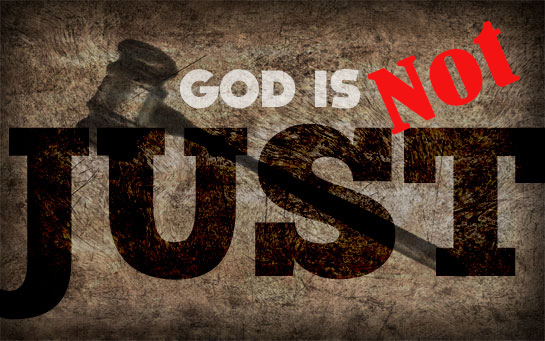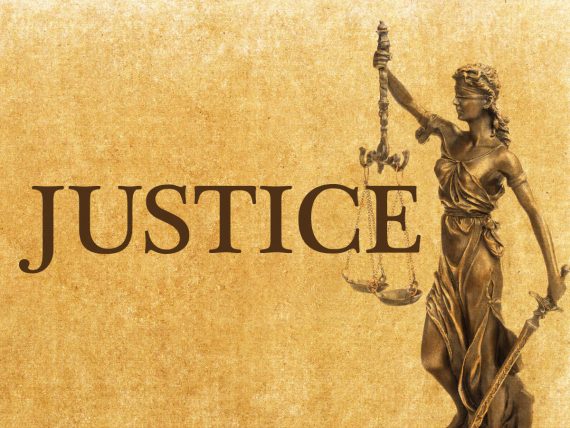I’m back! 2020 was a rough year, and 2021 will likely be difficult as well, but I am going to try to get back into blogging and podcasting.
In this first episode of 2021, I explain the new format for my podcast, and discuss three things:
- My thoughts on the response of some Christian pastors and authors on the January 6, 2021 election protest in Washington DC
- Mailbag: How to know you have eternal life and did not commit the unforgivable sin.
- Why God is not just, the Bible does not talk about justice, and how we can respond to injustice.

Is God a God of love AND justice? Nope.
On the topic of justice, here is a brief summary of what I say in the podcast, and also what I will be teaching in my soon-to-be-released Gospel Dictionary lesson on justice:
“Justice” is not in the Bible. Indeed, the English word “justice” is not found anywhere in the New Testament of the King James Version.
The trouble with justice begins in the Bible translation. On the one hand, there are several Greek and Hebrew words that often get translated as “justice” and then then are several other English words that are used as translations for the Greek and Hebrew terms.
Usually, translation troubles come from one direction or the other. For example, we have one English word “love” that is often used to translate four different Greek words for love (agape, philia, eros, and storgē). Other times, there are numerous English words that are often used to translate one Greek word, such as both faith and belief being used as a translation for pistis. With the justice word family, both of these translation troubles exist.
With justice, the two main Greek terms are krisis (2920) and dikaiosunē (1342). However, as seen previously, the best translation for krisis is judgment; not justice (see Judgment). In the passages where krisis is translated as justice, the term judgment (and specially, the concept of properly naming or identifying something) is a better translation (cf. Matt 12:18, 20; 23:23; Luke 11:42; Acts 8:33). Therefore, it seems best to always translate krisis as judgment rather than justice.

That leaves the dikaiosunē word family. The dikaiosunē word family (including dikē, dikaios, dikaioō) is variously translated as justice, justification, justify, just, and righteousness and a few others. You will notice that the term righteousness and justification have no English semantic connection, and yet they are both used to translate the same Greek term, dikaiosunē. As argued elsewhere in The Gospel Dictionary, it is best, when translating a single Greek term and for clarity’s sake, to pick one English term and stick with it. No English reader who has little knowledge of Greek would ever imagine that a single Greek word lies behind the translation of both righteousness and justification. So it is of immense help to the English reader to pick a single English word (and its word family) as a translation for a single Greek word (and its word family).
With dikaiosunē, we have two English choices. We can choose the “just” word family (justice, justification, justify) or the “right” word family (righteous, rectification—or rightification, rectify—or rightify). Since “rightification” is not an English word, the initial inclination is to go with the “just” word family. However, the Greek term dikaiosunē is most literally translated “to make right.” Since, as seen above, the term justice is so misunderstood and misapplied today, it seems that using the right word family is the “right” way to translate the dikaiosunē word family.
The Hebrew words tsedeq (6664) and misphat (4941) have also been translated as justice, but tsedeq is best translated as “righteousness” and misphat as “judgment.” So again, justice is not in the Bible.
But righteousness is. When humans cry out for justice, what we really want is righteousness. We want things to be set right. And God’s way of achieving righteousness is far better and far different than the human, earthly way of seeking justice. In fact, the two are usually at polar opposites of the morality spectrum. The human methods of achieving justice are often seen as unrighteous by God, while the divine methods of righteousness are often viewed by humans as unfair, unjust, and irresponsible. So it is not true, as people claim, that God is a God of love and justice. Rather, God is a God of love and righteousness, and the two are not at odds with each other.
But justice and righteousness are at odds with each other. Human history, including biblical history, reveals that when humans call for justice, what they really want is vengeance. But God has said that vengeance is His and He will repay (Deut 32:35; Rom 12:19). And how does God exact vengeance? How does He repay people for the evil they have done? Jesus shows us how. When God sets out to repay people for the sins they have committed, He dies for them. He freely forgives them. This “justice” of God does not fit any human definition or understanding of justice.
Human justice calls for people to get what they deserve. To be punished in a similar measurement to the pain they have caused others. Divine “justice” extends only love, grace, mercy, and forgiveness, all of which are the exact opposite of what people deserve. This is why we cannot call it justice. It is righteousness, but it is not justice. It is as Gandhi said, “Justice that love gives is a surrender. Justice that law gives is a punishment.”
None of this is to say that injustice does not occur in this world. Quite to the contrary, injustice is everywhere, even (and especially) in the political and religious programs (which often become pogroms) for justice. Our world is awash with injustice. The biblical solution to injustice, however, is not a better form of justice. In the same way that more war is never the answer to war, so also “better justice” is never the answer to injustice. Why not? Because all forms of justice lead to greater injustice. In fact, cries for “justice” often hide the scapegoating mechanism. Scapegoats are never truly seen. If you are able to identify your scapegoat, he or she is not your scapegoat. People think a scapegoat truly is guilty, and therefore, killing or punishing them is not wrong, but is only justice. But scapegoating is always wrong, and scapegoating is always justified. Therefore, both scapegoating and cries for justice must be done away with.

So what can we do about injustice? We can follow the way of God. God’s answer to injustice is righteousness. The righteousness of God is based on forgiveness, restoration, reconciliation, and redemption (see Righteousness), terms that are not usually related to justice. It is usually not considered “justice” to forgive the one who wronged you. But it is righteous. It is usually not considered “justice” to reconcile with the one who hurt you, unless that other person is first forced to make reparations (often unjustly), but reconciliation is righteous. So it incorrect to say that God is a God of love and justice. He is not. God is love (1 John 4:8). God is holy (Isa 6:3). God is righteous but God is not just. And there is a vast difference.




So glad your back in 2021 Jeremy. I hope this year is a year of safety and stability for you, your work and your family. Your examination of the concept of Justice in the bible is very good and you very carefully reveal how it doesn’t fit in scripture however as you clearly point out righteousness does (love, grace, mercy and forgiveness)
I enjoy reading your ideas of theology in the sense of it gives hope and light to see God as love. However there is a nagging feeling at the back of my mind that this is rather like that song “In a Barbie world..” Nice, sugary, easy to believe even desirable. But contrast that with Moses slaying of all in the Ex 32:27. I don’t think the recipients (medianites) would really go for that take on God. The last thing I would do is say anything against God. Whatever his motives in the matter is not for me to interpret. All meaning that there is clearly a “terrible and awesome” side of God that puts fear into me. How to reconcile those two perceptions?
I was born with mutilated hands and used to see the suffering in my father’s eyes and suffered greatly from people’s fake feelings and looks particularly that i live in Egypt: The Third World..I got married and had two beautiful sound boys. That time only I reconciled with Jesus and God. But when the eldest son got married, he had Daniel in autism. A very well built beautiful child who acts like a fool. Now the question is: If God is just as he says and all that talk in the Bible, teachings and psalms say, why does he cause all this suffering ???? First to my father, now to me and my son when he looks at his son??? Is there any reason for this??Now, I am worse than ever and certain that if God had really existed or cared about us, he wouldn’t have cause us all this pain.
Naguib there is no easy answer to what you are going through. It must be heart rending and very difficult to cope with. What I am about to say is only in my experience…. I have noticed when helping people in similar situations to yourself its has ultimately been identified as often a genetic/hereditary link. Some generations it doesn’t appear but then appears in the next. A genetic switch gets turned on or turned off. We all live in a world where sadly things can go terribly wrong. No matter what goes wrong God is still there for us and his love is never ending
I know all that about genetics. But, I believe you went off the main theme; the query is: If God really had existed, why did he permit all this suffering and pain??What pleasure does he get making all those tortured beings???
I enjoy your detailed analysis of the concept of justice, love, righteousness, and forgiveness. it was very insightful and informative!
However, I do have issues with these concepts going from the theoritical to actual life. In my Chriastian experience with loving, forgiving, reconciling, etc., I see a troubling cycle develope. A cycle that is condusive to abuse and violence. I have seen this cycle of abuse over and over again. These ideas are wonderful to think about, but in practice, they create the perfect environment for evil to flourish.
When evil has no consequence, evil has not deterrent, evil has no challenge, it grows. I have seen far too often that this concept of no justice only makes the vulnerable more vulnerable and the oppressive more oppressive.
This all makes me wonder: How can following the precepts of a Holy God somehow make evil so comfortable?
That doesn’t make sense.
God’s answer to injustice IS death and hellfire.
“For the wages of sin is DEATH.”
God is a God of vengeance; throughout the old testament, God ordered frequent genocides. God did not “forgive” pharoah or the egyptians: God plagued them and ultimately killed their first-born sons.
I don’t see how it’s “righteous” to forgive a murderer with no consequences to them.
Forgiving injustice does not eliminate injustice: it enables it.
Punishing injustice does not create more injustice: it PREVENTS and deters FUTURE injustice. Without our penal system, there would be a lot more murders, rapes, thefts, and war crimes than their currently are.
Just because some old book says it is “righteous” to forgive everybody for every injustice doesn’t make it true.
Even if Jesus was real, all that happened was that he suffered unjustly and the rest of the world remained evil and full of injustice, even to this day. Nothing good came of his death; his death even inspired more murders, wars, and genocides, even to this day.
And if we’re supposed to wait for either the world to end or our own death for God to “make things right”, then there is no point to being alive.
And if God’s gonna “forgive” all injustice anyway because he’s “righteous”, then there’s no point to anything we experience because even those who commit the most heinous crimes and unjustly inflict the most suffering will end up with the same reward as everybody else in the end.
And if forgiveness boils down to “belief in jesus”, then a LOT of otherwise harmless individuals are gonna end up in hellfire and a LOT of HORRIBLE individuals are gonna end up rewarded. If that’s what God calls “righteous”, then God is evil.
I think calling God either “just” OR “righteous” requires a lot of mental gymnastics.
In the REAL world, we are on our own to create and take justice, and there is no “righteousness” in “forgiveness” because “forgiveness” doesn’t change anything.
If anything, God is UTTERLY indifferent and there is NO “right” or “wrong”. That’s the ONLY answer that makes any REAL sense.
However, the Greek term dikaiosunē is most literally translated “to make right.”
Greetings in Christ. How do you get “to make right”?
How can you get that from the root meaning of δικη which is derived from G1166 Probably from G1166 δεικνύω deiknuō= to show. The IER is diek= to show.
Here’s something to think about. Our Redeemer, Jesus Christ said something very interesting in John 5:19, 30. Testifying with a double asseveration–Then Jesus answered and said to them, Truly, truly, I say to you, The Son is not able to do anything from Himself, except what He may see the Father doing; for whatever that One does, these things also the Son does likewise. (Joh 5:19 LITV)
I am able to do nothing from Myself; just as I hear, I judge; and My judgment is righteous, for I do not seek My will, but the will of the One sending Me, the Father. (Joh 5:30 LITV)
This is because of what He said in John 6:57
As the living Father sent Me and I live through the Father so also the one partaking–eating Me [the Bread of Life] even that one will live though Me.
Justice according to Corpus Juris 35 434–Is the dictate of right …
Right belongs to natural law theory as well as Justice, it is soulish and not spiritual as the Law of God is (Rom 7:14). Right is inherent to one who is sui juris–one becomes his own master in Society. Our Lord Jesus Christ who stated that all authority (exousia) in Heaven and on Earth had been given to Him could not do anything from Himself. In natural or legal right one does ALL from himself. There are NO rights in Holy Scripture.
The Christian religion facilitated the Creation of the UNITED STATES OF AMERICA for they are in the condition of Deu 29:4 at the tree of learning the knowledge of Good and Evil (Gen 2:9 LXX) having a moral personality making moral judgments and believing in “free will” which is a necessary element for justice and sui juris. Scripture disagrees for the word doulos deals with ones will. We according to Paul in Romans 6 are either slaves of Sin (Gen 3:22-24; Eph 4:17-18) or slaves of Righteousness which results from one obedience of faith (Rom 1:5).
Those who are led by the spirit of God (new nature) these are the sons of God (Rom 8:14). No debt men is in the context of Romans 13:8-10–agape is the pleroma or fulness of the Law of God, its very essence.